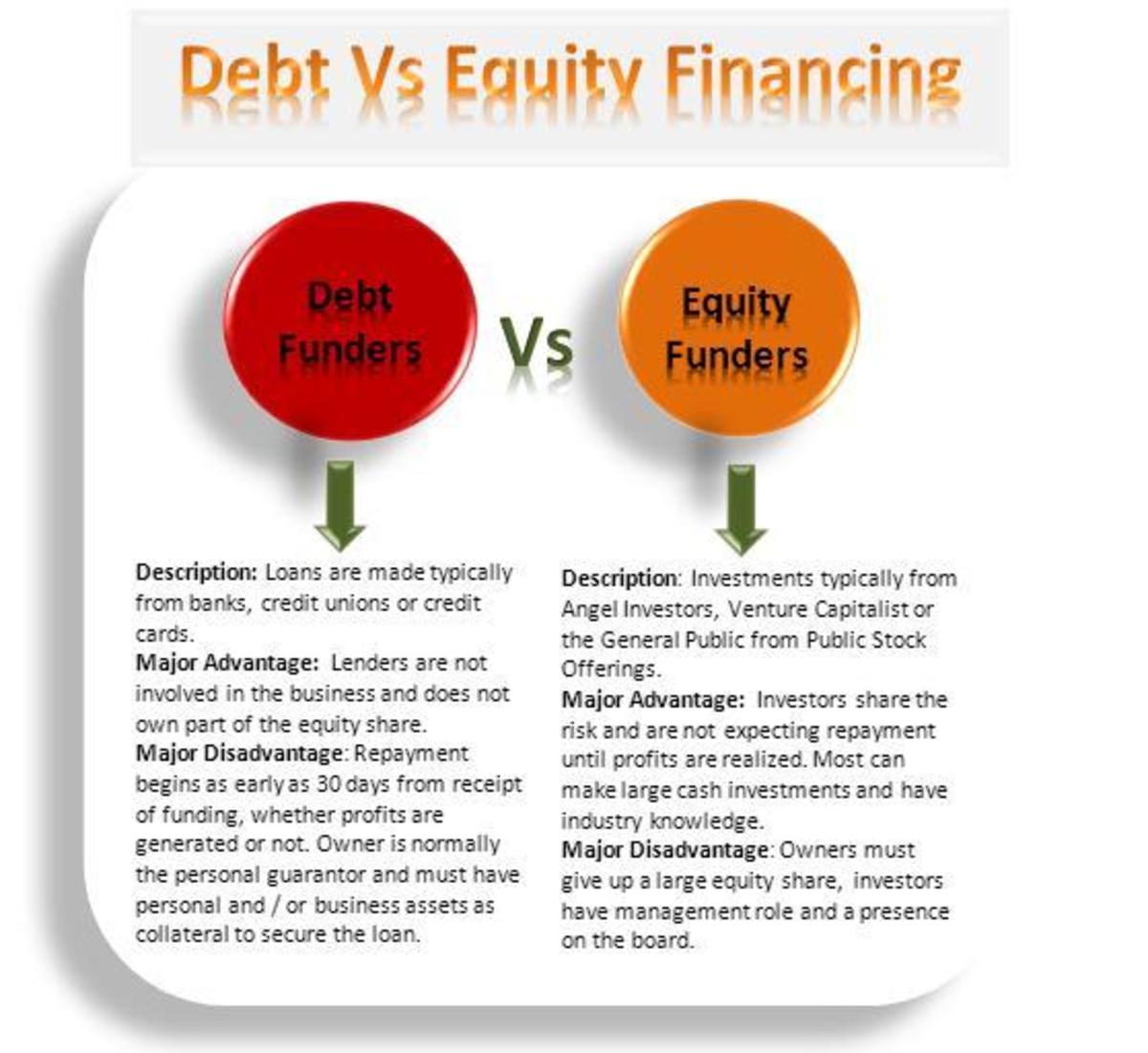How Can a New Business Be Financed? 5 Ways You Can Use
Introduction
How can you finance your new business? What are the five main ways to finance a new business?
We'll look at the 5 main ways to finance your business: cash, personal debt, business debt, equity / shares and a pledge to share future earnings.
Cash
The simplest way to finance a new business is to save up cash to pay for your initial expenses. By saving up cash to invest in the startup of the business means you have no debt. This lowers the minimum monthly payments the business must pay. If you have a bad month, there is no debate over paying your business’ rent or debt payments. Starting a business with cash eliminates the risk of owing a several hundred dollar a month debt service payment when you had no profit.
Some people raise cash for a business by pulling money out of a retirement account. This is not advisable, because you have to pay income taxes on the withdrawal and a penalty for early withdrawal if you are younger than 59 ½.
Another benefit of starting a business with cash is the impact it has on purchasing and investing. Those who work to raise the cash are more conservative with their spending. They research purchases much more thoroughly, making fewer mistakes. They are more likely to buy older equipment that is good enough to do the job instead of buying more expensive equipment. They are less likely to repeat the mistakes of many internet dot-com bubbles in the 2000s, expanding headcount when flush with cash without necessarily having value added work for them to do, much less buying a new building because they have the money. When you are paying cash, you are more cautious in business spending. The result is slower expansion and growth, but you are less likely to take big risks that put the business at risk. If you have to raise the cash first, you are less likely to take make-or-break risks that increase the odds of failure.
Another benefit of raising cash to fund a new business is that you have control over the assets involved. Holding a massive garage sale to raise cash for the business is much better than securing the business loan with your home and having to sell everything later in case of foreclosure. Selling that third car to raise $5,000 to buy new equipment avoids the risk of having a car taken at an inopportune time.
And if you only fund the business via cash, you are more likely to go slow by working at your day job. This forces many people to build up a business to the point that it actually replaces their regular income, instead of taking on debt to both run the business and paying their living expenses.

Personal Debt
Personal debt to finance a new business involves taking out personal loans to finance the new business. Personal debt can come in the form of personal loans from the bank, buying items for the business on personal credit cards, loans via crowd-funding websites and borrowing against one’s retirement account. Many people take out loans from family and friends to finance their debt.
Personal debt can be the most expensive option on this list. Cash advances on credit cards can lead to 20% interest rates (or higher), while a business loan rarely tops 10%. Another risk of personal debt taken out to finance a business comes with significant personal risk. If the business goes under and takes someone’s income with it, they are still liable for the debt service payments.
Some people take on personal debt in the form of home equity loans to start their business. Home equity loans are popular because of their relatively low interest rate. This financing method is dangerous for several reasons.
First and foremost, you lose the ability to discharge the debt in bankruptcy without losing your house. Second, you’ll have to pay both the mortgage and the home equity loan whether or not the business generates a profit, and payments are due even after the business closes its doors. Securing a line of credit for your business by using personal assets for collateral means you could lose your car and tools when your business goes under, limiting your ability to get another job after losing your primary income.
It is not a good idea to borrow against your retirement account to raise money for your business. If you lose your job, you must pay back the 401K within 90 days – exactly when you have lost your primary income source. If you can’t pay back the loan, you owe income taxes and early withdrawal fees of 10% on the unpaid loan amount.
Borrowing from family and friends comes with its own risk. If your business goes bad and you cannot repay their loans, you don’t just take a hit on your credit report; family dinners become painful. If the business succeeds, family and friends may seek to take an ownership share. There is a dangerous tendency to nepotism when someone takes out personal loans to fund a business. If Mom invests $50,000 in your business, she’s more likely to push you to hire your unemployed younger brother in lieu of payments – regardless of the value (or lack thereof) that he brings to the business. If a friend who loaned you money to start up the business finds himself unemployed, he may seek a job with the company. You can end up with lenders becoming employees, undermining the decision making hierarchy in the business.
Never take on personal debt to finance a business without clear contracts defining the loan amount, loan terms and interest rate. This is especially true when the loans are with family members. Be especially careful of a family member loaning you money for your business that is then forgiven as a gift – this could generate a hefty tax bill.

Business Debt
Business debt is debt taken out in the name of your new business and secured by its assets. Business debt can be easily managed when it is secured by various assets. For example, it is common for businesses to take out a loan with a supplier secured by the inventory itself to get inventory to sell at a profit. Taking out loans secured by the raw materials or products for sale is called factoring. One side benefit of factoring for those who sell their products to customers via factoring is that they can sell the notes of slow-pays to third parties that offer cash in return for the right to pursue the debtor for the amount due. This means that the $8,000 loan with your customer for the $8,000 in toys can be sold to a third party for $5,000 to raise capital quickly instead of waiting six months in the hope that they will pay.
Manufacturing equipment is often secured by the equipment itself, allowing a business to put 20% down and start generating a profit from the operations without having to save up for the full purchase price of the equipment.
Business debt may come from a bank, a credit union or even the Small Business Administration. SBA loans set a number of requirements in order to qualify, such as being a small business the way they define it for the industry. They may give preferences to specific demographic groups for loans, giving preferences to disabled veterans and minorities.
Business debt can be liquidated by a business bankruptcy as long as the business was set up as a separate entity from the business owner and the owner didn’t pierce the corporate veil.
Business debt and assets have several advantages over personal debt. The individuals who found the business aren’t personally liable if the business fails. The business loan interest rates aren’t subject to a spike in interest rates when the business owner is late paying a medical bill. Interest on business debt is usually a tax deductible expense for the firm.
Future Sales / Profits
Personal investment contracts, in which someone promises to pay a portion of their future income in return for a loan today, are not yet established by the courts. However, you can set up equity deals or personal loans that tie repayment to future sales.
These deals give someone a greater percentage of the profits of a business in return for the risk of receiving nothing if cash flow barely meets expenses. You can set up an equity investment deal with a silent partner that says they’ll receive 10% of all profits for the next 5 years, instead of 7%, if they agree that they will receive nothing during months when the business isn’t generating a profit. Or the deal can be set up so that they receive 20% of the profit after a minimum threshold that pays the monthly bills and base payroll has been met.
The benefit of this business funding approach is that you don’t owe your investors or lenders payments until you have a profit. If the business is break even, the payments to lenders aren’t due. The downside of this approach is that many lenders and investors won’t want to invest in the business, even with the higher upside potential, because of the risk that they will never get repaid. One risk the business takes is that they owe the investor / lender a much greater amount of money when there is a windfall which would be larger than they’d otherwise owe if they had a set monthly payment. If you want to repay an investor with a portion of future sales, make sure the contract covers what happens if you land a large pre-payment for an order. And address how the investor is paid if the business is sold.
A downside of pledging a portion of future sales / profits is that it leads to much deeper scrutiny of your books. If you say you didn’t earn a profit and therefore have no payment to the investor this month, expect questions as to how much was earned and how much was spent. This level of inquiry rarely comes up if you only have to make set debt service payments and pay them on time and in full.
Equity / Shares
Selling a percentage of the business to raise capital is only available for several cases. The first is when you have an existing business with solid cash flow, such as selling a 10% stake in a restaurant in order to raise capital to expand.
Another time this is used occurs when the business uses a partnership model and has high potential income. A doctor selling half of his business to add a partner so his practice can continue to see patients while he takes a two week vacation is an example of this. One of the few other times someone can sell equity or shares of a business is when there are solid assets behind the business that provide something the shareholders can sell to get money back from the business if it closes. You could sell a share of the business, including patents, intellectual property rights and manufacturing equipment.
Selling equity or shares is dependent upon the valuation of the business – and too many business owners value their business too high. Watching the TV show “Shark Tank” teaches you that someone with an unrealistic valuation of their business based on future growth or potential contracts will lose out on the deal, because the investor wants to use a conservative valuation.
If you give away partial ownership of your business, you become beholden to the shareholders. You lose full control over the operation. You also take on risks, such as having to liquidate part of the business if one of your shareholders declares bankruptcy and their share in your business must be sold to pay their personal debts. Equity and shares must also be liquidated after the death of a stakeholder in order to properly pay the money into the person’s estate.
If you plan on selling equity or shares of the business, set up a plan on how you will handle the death, divorce, disability or bankruptcy of one of the members. Realize that small business shares are nowhere nearly as liquid or easily sold as shares of stock in an investment account.
Giving away equity instead of taking out loans also hurts your business’ ability to seek other methods of raising money. If you have given equity to several partners instead of getting loans from them, you will not be able to attract venture capitalists because too many other people are already invested in the firm.
Never give away equity to people who should be employees. Too many businesses give individuals who would be general employees equity. They then lose leverage if they try to sell the business, because lower level employees don’t like the price, and they lose the ability to raise capital through angel investors because there are too many parties that can say no to the deal. Wait until you have the revenue to hire employees. Or raise cash via debt to pay their salaries, instead of giving up a portion of the future revenue stream.







